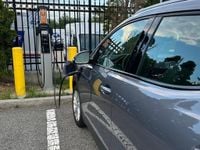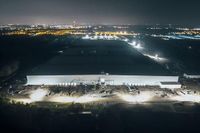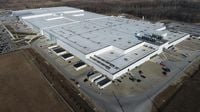In a significant development for Michigan's electric vehicle sector, the Michigan Strategic Fund Board has approved the transfer of a $120 million performance-based grant from General Motors (GM) to LG Energy Solution. This decision, made on March 25, 2025, comes after GM sold its stake in the Ultium Cells battery plant located in Lansing and Delta Township.
The transfer allows LG Energy Solution to finalize its acquisition of the 2.8 million square foot facility, which is nearing completion with about 98% of construction finished. The plant is expected to produce advanced battery cells critical for electric vehicles and other applications. According to Dae Sik Choi, vice president of LG Energy Solution, "Advanced batteries are an industry that’s critical to American competitiveness and job creation in the 21st century."
Despite GM's exit from the joint venture, both companies remain committed to creating a combined total of 3,200 new jobs in exchange for the $600 million in state funding awarded in January 2022. GM is now responsible for hiring 1,840 workers at its Orion Assembly plant, where wages will be determined by United Auto Worker contracts, while LG Energy Solution is tasked with hiring 1,360 workers at the former Ultium site, with estimated wages of about $55,000 per year for manufacturing positions.
George Cook, GM's regional director of state and local public policy, expressed confidence in meeting these commitments, stating, "We fully plan to meet all of our commitments." This sentiment was echoed by Lisa Niscoromni, director of government affairs for LG Energy Solution, who noted the company's familiarity with the factory's capabilities due to its partnership with GM in the Ultium brand.
However, the road to job creation has not been without its challenges. As of September 30, 2024, the former Ultium facility had only 148 jobs listed, averaging $84,000 in salary, while GM’s Orion Assembly factory reported 289 workers, significantly below the required base number set by the subsidy deal. The delays in job creation have raised concerns among state legislators regarding the viability of these projects.
The backdrop to this transition includes broader challenges within the electric vehicle market. Sales growth has been slower than projected, leading to excess capacity for automakers. While EV sales increased by 10.5% in February 2025 compared to the previous year, this still represented an overall market share of under 8%. Additionally, the Trump administration's recent announcement of plans to roll back federal environmental regulations could further complicate the landscape for Michigan's auto industry.
As part of its commitment to the state, GM is investing $4 billion to convert its Orion Township facility for electric vehicle production, which is currently scheduled to begin in mid-2026. This project aims to create an additional 1,840 jobs, which GM is still obligated to fulfill despite the separation from the Ultium project.
In a move to secure the future of the battery plant and its associated jobs, the Michigan Strategic Fund Board has ensured that both GM and LG Energy Solution are now independently responsible for meeting their respective job creation and investment metrics. This separation was designed to mitigate the risk of a clawback, which would involve the state demanding the return of taxpayer dollars if job creation targets were not met.
As the transition unfolds, LG Energy Solution has indicated that it anticipates creating up to 1,700 jobs at the Lansing facility, which aligns with the job creation requirements outlined in the state’s critical industry program grant. Lansing Mayor Andy Schor has expressed optimism about LG Energy Solution's impending ownership, stating that it will not only bring good-paying jobs to the area but also foster new industries and customers.
Despite the uncertainties in the EV market, both companies have expressed their commitment to fulfilling their obligations under the amended agreements. Cook emphasized GM's confidence in its manufacturing capabilities, asserting, "GM believes we have the right cell and manufacturing capabilities in place to grow with the EV market in a very capital-efficient manner."
As the electric vehicle industry continues to evolve, the successful completion of these projects will be crucial for Michigan's economic landscape and its position as a leader in the automotive sector. The state's investment in these initiatives reflects a broader commitment to fostering innovation and job creation in the rapidly changing automotive industry.
In summary, while the transfer of the $120 million grant marks a pivotal moment for both GM and LG Energy Solution, the focus now shifts to the fulfillment of job creation commitments and the successful operation of the newly independent battery plant. With the backing of state funding and a growing demand for electric vehicles, the future of Michigan's electric vehicle industry looks poised for growth, albeit with challenges ahead.







